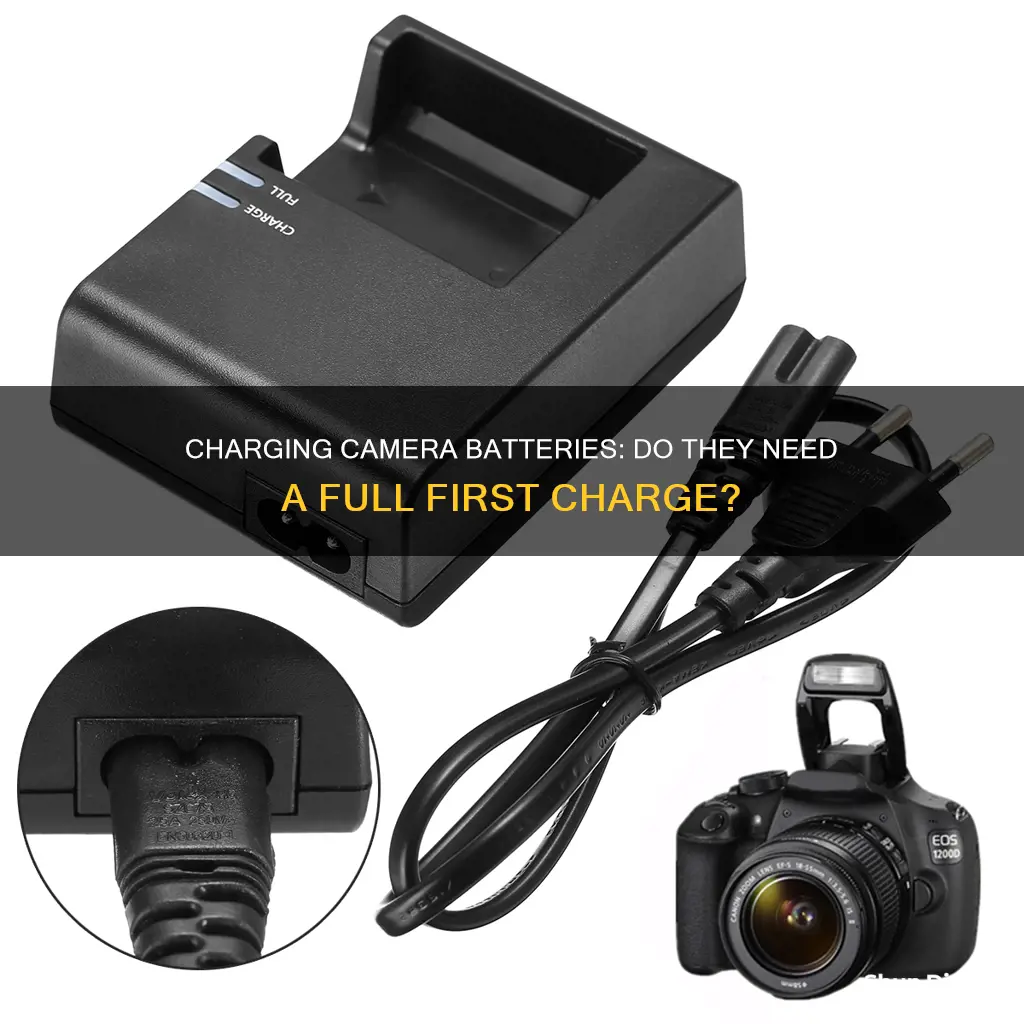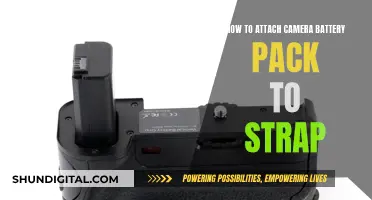
When you get a new camera, it's important to consider how to charge the battery for the best performance and longevity. While it's not necessary to fully charge a new camera battery, it's recommended to give it an initial full charge before use. New camera batteries typically come with a minimal or partial charge, which is usually around 20% to 40%. This partial charge is optimal for long-term storage.
It's safe to use your camera even if the battery isn't fully charged, and you can avoid potential issues with the battery's performance and lifespan by following a few guidelines. Lithium-ion batteries, which are commonly used in cameras, prefer partial discharge to deep discharge. Therefore, you can recharge your camera battery at any time and avoid letting it fully discharge. Additionally, it's best to avoid overcharging the battery by leaving it on the charger for an extended period after it's reached a full charge.
To maximize the lifespan of your camera battery, it's recommended to have at least two batteries on hand and rotate between them. Label the batteries with the purchase date to easily track their age. Proper care and storage of camera batteries can result in a lifespan of five years or more.
| Characteristics | Values |
|---|---|
| Should you fully charge a new camera battery? | No, it is not necessary to fully charge a new camera battery. It is safe to recharge camera batteries at any time. |
| Charging time | Charging time varies depending on the battery type and conditions of use. On average, it takes around 2 hours to fully charge a camera battery. |
| Battery life | A camera battery should last at least five years if handled correctly. After a few hundred cycles, the battery capacity may decrease, and it should be replaced. |
| Battery storage | It is not advisable to store camera batteries in freezing temperatures or elevated temperatures. Store in a cool, dry place and avoid leaving the battery in the charger for extended periods. |
| Battery performance | Battery performance can be affected by extreme temperatures, with high temperatures potentially causing batteries to explode. Keep spare batteries warm when shooting in cold conditions. |
| Battery preservation | To preserve battery power, turn off the camera when not in use, avoid unnecessary refocusing, turn off image stabilizers when not needed, and switch to manual focus in low light or low contrast situations. |
| Third-party batteries | Third-party batteries may not meet the same quality standards as branded batteries and may not be compatible with the camera's charger. |
What You'll Learn
- New camera batteries are shipped with a minimal charge
- It is safe to recharge camera batteries at any time
- Camera batteries should be retired after a few hundred cycles
- Camera batteries should be stored at a temperature between 10°C to 30°C (50ºF to 86ºF)
- Camera batteries should be kept away from excessive heat and cold

New camera batteries are shipped with a minimal charge
New camera batteries are typically shipped with a minimal charge. This is because lithium-ion batteries, which are now standard in cameras, are best kept at a partial charge to prolong their life. It is recommended that you charge your new camera battery before first use, but this initial charge doesn't need to be for an extended period. A full charge cycle usually takes less than 30 minutes, and you should refer to the manual for the manufacturer's recommendations.
It is a good idea to charge your new camera battery before use, as this may extend the overall performance and life of the battery. However, it is important to note that you should not leave your battery in the charger for longer than necessary. Overcharging can cause a deterioration in battery performance and, in rare cases, batteries may explode due to excessive heat.
Lithium-ion batteries perform best when kept between a 40% and 70% charge. This is because lithium-ion chemistry prefers partial discharge to deep discharge. Therefore, it is safe to recharge your camera battery at any time and to use it when it is not fully charged. You should also avoid letting your camera battery fully discharge, as recharging from flat may cause the cells to become unstable and overheat.
To maximise the life of your camera battery, it is recommended that you have at least two batteries on hand and rotate between them. Labelling your batteries with the date of purchase will help you keep track of their age and performance over time.
Charging Your Coolpix Camera: A Step-by-Step Guide
You may want to see also

It is safe to recharge camera batteries at any time
Camera batteries have evolved from AA batteries to rechargeable lithium-ion batteries. It is safe to recharge camera batteries at any time. Lithium-ion batteries accept more charge, hold their charge longer, and provide more accurate information about how much power they retain. They can be recharged when they are partially discharged, and you don't have to wait for them to be fully depleted before recharging.
Lithium-ion batteries, however, should not be left fully discharged as the cells might become unstable and overheat. It is recommended to recharge them when the charge becomes low to avoid this issue. Additionally, these batteries self-discharge over time, losing around 2-3% of their charge per month, so it is important to check the manufacturing date to ensure they are new.
When charging a new camera battery for the first time, it is generally recommended to charge it fully before use. However, this is not necessary for modern lithium-ion batteries, as they do not suffer from memory effects like older NiCd batteries. Leaving a lithium-ion battery in the charger for an extended period will not damage it, as the charging process is automatic and will stop once the battery is fully charged.
To prolong the life of your camera battery, it is advisable to avoid letting it fully discharge and to recharge it when needed. It is safe to use the battery even if it is not fully charged. Additionally, it is recommended to have at least two batteries on hand to ensure you have a fully charged backup when needed. Proper care and storage of camera batteries can help extend their lifespan, which is typically around five years or more.
Are Camera Batteries Charged? Understanding Camera Battery Basics
You may want to see also

Camera batteries should be retired after a few hundred cycles
New camera batteries are not shipped fully charged, so it is recommended to give them a full charge straight out of the package. This may extend the overall performance and life of the battery. They do not take long to charge, and even on a low or empty charge, it usually takes less than 30 minutes to obtain a full charge with a standard charger.
To extend the life of your camera battery, it is important to follow some best practices. Avoid continuously charging the battery without using it if it is already fully charged or close to fully charged, as this may cause a deterioration in performance. It is also recommended to store the battery at the correct temperature, as charging may be paused if the camera or battery is not within the proper temperature range. Additionally, be sure to use only genuine brand-name battery packs, cables, and chargers.
Best Camera Battery Chargers: De-A45 Edition
You may want to see also

Camera batteries should be stored at a temperature between 10°C to 30°C (50ºF to 86ºF)
Storing batteries at higher or lower temperatures can cause permanent damage and reduce their capacity. For example, temperatures close to or below freezing can slow down the chemical reactions inside the battery cells, resulting in a loss of capacity. On the other hand, very high temperatures can cause the battery to discharge rapidly and may also result in permanent damage.
In addition to maintaining the ideal storage temperature, it is also important to keep your camera batteries at the optimum charge level. Storing lithium-ion batteries at a full charge accelerates their loss of capacity. It is recommended to store them at around 40% charge, which minimises age-related capacity loss while keeping the battery operational.
Furthermore, it is worth noting that different types of batteries have different storage requirements. For instance, nickel-based batteries can be stored fully discharged, while lead acid batteries should be stored fully charged.
By following these guidelines on storage temperature and charge level, you can help ensure that your camera batteries remain in good condition and provide reliable performance when you need them.
Charging Your GoPro: A Step-by-Step Guide
You may want to see also

Camera batteries should be kept away from excessive heat and cold
Camera batteries are sensitive to temperature changes, and extreme temperatures can affect their performance and longevity. It is important to keep batteries away from excessive heat and cold to ensure they function optimally and to prolong their life.
When exposed to excessive heat, camera batteries can deteriorate rapidly. High temperatures can cause the battery fluid to evaporate, reducing the battery's overall lifespan. In addition, heat can increase the battery's internal resistance, leading to decreased performance and a higher risk of failure. For this reason, it is recommended to charge batteries at an ambient temperature of between 10°C and 30°C (50°F and 86°F).
On the other hand, cold temperatures can also have a significant impact on battery performance. A drop in temperature can cause the battery's power to deplete much faster. For example, a decrease of 10°C (18°F) can result in a 50% reduction in battery life. This can be extremely inconvenient for photographers, as it may cause the battery to run out of power prematurely during a photoshoot. To mitigate this issue, photographers often carry extra batteries when shooting in cold weather.
To maintain optimal battery performance in cold weather, it is advisable to keep batteries warm. One effective method is to store them in an inside pocket close to the body, such as an inside coat pocket. This helps to utilise body heat to keep the batteries at a stable temperature. Another strategy is to use a small fanny pack worn under outer layers, providing easy access and consistent warmth for the batteries.
It is important to note that warming up cold batteries should be done gradually. Placing them too close to a heat source, such as a heater or fire, can cause permanent damage. Instead, allowing them to warm up slowly at room temperature or using body heat is a safer approach.
In summary, camera batteries should be stored and operated within a moderate temperature range to ensure optimal performance and longevity. By avoiding excessive heat and cold, photographers can extend the lifespan of their batteries and reduce the risk of performance issues during important shoots.
How to Prepare Your Polaroid Camera for Instant Shots
You may want to see also
Frequently asked questions
No, new camera batteries are likely to have a minimal charge. It is recommended to fully charge your battery before using it for the first time.
The charging time may differ depending on the remaining capacity of the battery pack and the charging conditions. It is generally recommended to charge the battery until the charger indicates that it is fully charged. For instance, the battery for the Canon EOS 750D takes about 2 hours to fully charge.
It is not a good idea to let your camera battery fully discharge. Your camera will indicate when the charge is low enough to need recharging. Batteries last longest if they are only topped up when a recharge is needed.
Lithium-ion batteries prefer partial discharge to deep discharge, so it is safe to recharge your camera battery at any time. You can also leave a battery with less than half its full charge on charge overnight, although it is best to avoid charging longer than necessary.







